 By Tyler Micik The 152nd Delaware General Assembly gaveled into the second and final leg of session this week. As a reminder, any bills that were introduced last year and were not defeated or enacted remain active and carry over to this year. Overall, it was a pretty light week as far as acted-upon legislation goes – only a small number of bills (none of which the State Chamber is following or engaged on) were heard in committee and placed on the full agenda for a vote in both Chambers. Additionally, the Senate did not gavel into session on Wednesday. Much like the first week of school, this week is a time for legislators, lobbyists, and others to catch up after the long break and welcome new faces. One of those new faces is Representative Valerie Jones Giltner who was sworn into office on Tuesday. Rep. Giltner replaces Rep. Briggs King, who resigned in November, and will represent Delaware’s 37th House District. The State Chamber looks forward to working with her and all the members of the General Assembly this year in support of our 2024 policy priorities. One issue the State Chamber has its eyes on and will be a topic of conversation in the coming weeks is HB249, known as the DNREC Permit and Fee Increase Bill. The current version was introduced on June 28th and has been assigned to the House Natural Resources and Energy Committee. We expect a substitute bill to be introduced, although it’s unclear what it will look like. As currently written, HB249 proposes 155 permit/fee changes. DNREC is proposing these changes because 92% of the fees have not been adjusted since 1991. The proposed adjustments aim to contribute to funding investments in technology, salaries, and other aspects for the Department. You can view the bill here and a copy of the fee proposal chart here. Please look at both and let me know if you have any thoughts/feedback. We want to hear from you! And if you’re interested in staying up to date on environmental policy, consider joining our Environmental Committee.
0 Comments
 By Tyler Micik It's a new year and as the sound of holiday bells subsides, the ringing of bells within Legislative Hall begin again, signaling the start of the second leg of the 152nd Delaware General Assembly. The State Chamber looks forward to working with members of the Delaware General Assembly to achieve our 2024 policy priorities. Our policy priorities are a coordinated list of feedback from our members that includes items we’ve identified as critical because they impact not just our members but the business community at large—regardless of size and industry. Please keep in mind this list is not exhaustive, and it’s designed to be a living document that’s ever-changing to meet the needs of the business community. I’d like to take this opportunity to highlight a couple of topics mentioned in this list. FRANCHISE LAWS Unlike the old saying “Don’t shoot the golden goose,” some members of the General Assembly are proposing legislation that would shoot Delaware’s “golden goose.” Incorporation fees and unclaimed property revenues make up almost half of Delaware’s net general fund revenues. Delaware is internationally recognized as an incorporation destination due to its business-friendly tax laws and Court of Chancery. Corporations registered in Delaware don’t pay corporate income tax and corporate lawsuits are settled by the Court of Chancery—a non-jury trial court with a long history dating back to 1792, comprised of judges specializing in corporate law. For these reasons, companies choose to call Delaware their corporate home despite intriguing offers to go elsewhere, and other states’ efforts to try and duplicate Delaware’s laws. The introduction or passage of any policy directed at undermining these laws will cause corporations to leave, other states to reap the rewards, and Delawareans will be asked to make up for lost revenues through other means like a sales tax, which Delaware—along with only four other states—does not have. PERMITTING Delaware has made significant improvements to its permitting processes, and we thank the Governor and the General Assembly for doing so, but more work must be done. Many businesses are good stewards of the environment and the communities they serve. The perception by some to the contrary, in most cases, is inaccurate and benefits no one. We hope that policymakers will support laws and law-making processes that are collaborative and allow for certain and predictable comment periods for the business community and all stakeholders so that real progress can be achieved. We can’t accomplish anything, especially the State’s clean energy goals, if project timelines are unclear and the obligations placed on businesses are overburdensome. The decisions made this year by those in the General Assembly and by Delaware voters in the fall will have lasting impacts on Delawareans and Delaware’s reputation as a business-friendly state. As the state’s largest business advocacy organization, the Delaware State Chamber of Commerce is uniquely positioned to bring parties together to solve problems, create jobs, promote business, and improve the quality of life for all Delawareans. In that spirit, we look forward to continuing to advocate for our members in 2024.  By Regina Donato “The Delaware State Chamber of Commerce's passion and commitment to the Delaware business community excites me,” says Nadir Rasheed of Waste Management. “I really enjoy the way the State Chamber not only engages their opportunities, problems and concerns, but also presents the community with several solutions to make Delaware an even more beautiful place.” The Delaware State Chamber of Commerce is the unified voice for business. We are uniquely positioned to bring people together to solve problems, create jobs, promote business, and improve the quality of life for all Delawareans. Our two pillars are:
 To further drive our mission and diversify our network, we are seeking individuals to serve in our reinvented ambassador program. Ideal candidates are energized by the State Chamber’s mission and committed to helping improve the state of Delaware. We are looking for people who are passionate and willing to foster new relationships for the Chamber within their individual networks. As the Delaware State Chamber of Commerce, it is our goal to reach and represent everyone in the Delaware business community state-wide. As a key volunteer for the State Chamber team, Ambassadors will serve as outward-facing representatives of the organization with three key goals:
We welcome the following Ambassadors:
If you're interested in becoming a State Chamber Ambassador, we want you! Please fill out this form. Candidates must work for a member organization to be considered for the Ambassador Committee. The group will meet bi-monthly, with our first meeting on July 26th at 12:00 PM. To learn more about the role, responsibilities, and benefits, feel free to read the full job description or contact me at rdonato@dscc.com.  By Tyler Micik The General Assembly will complete its first leg of the 152nd Session on Friday evening. This wraps up a busy session, filled with legislation that, on behalf of our members, the State Chamber was actively engaged. It was one that saw many changes and firsts, including arguably the youngest and most diverse General Assembly in Delaware’s history with the addition of nine new legislators—three seats in the Senate and six in the House. Despite some concerns from members in both the House and Senate over the 10% increase from last year’s budget, the General Assembly passed a $5.6B operating budget (HB195) for Fiscal Year 2024—yet another record-breaking budget in our state’s history. A $194.5M supplemental budget (HB196) in one-time measures and contingency funds also passed. Part of the State’s Chamber’s mission is to bring the business community and policymakers together at the table to solve problems and help shape policy decisions. A prime example of this collaboration was the enactment of HB102 and HB104, which were part of a larger package of four bills (HB101 – HB104) sponsored by Representative Bush. Both bills, often referred to as Ready in 6 bills, are aimed at improving and expediting the permitting process for economic development projects in the state. Additionally, language from HB101 was incorporated into SB160 (Bond Bill) as a pilot project via epilogue language (section 14, page 11). The State Chamber played a role in championing these bills because these improvements are a method to enhancing Delaware’s competitiveness to win projects that would produce jobs and opportunities for Delawareans. An overview of bills that passed are:
Other bills signed by the Governor:
Bills headed to the Governor for signature:
Bills that didn’t make it through this year:
WHAT HAPPENS NEXT? Any bills that were introduced and did not make it to the Governor’s desk will be carried over to next year for consideration. This summer and into the fall we will be ramping up our Member-to-Member program, which brings policymakers to your place of business so that you can share how your company operates, express your compliments and concerns, and discuss the impact policy proposals—like the ones mentioned above—have on your business and employees. Like customer relationships, establishing and maintaining relationships with elected officials is important because it helps create a better understanding for all parties and leads to better policy decisions. These conversations will highlight important pending legislation which will be worked on this offseason and resurface again next year like:
For more information on the State Chamber’s positions and actions related to any of the bills mentioned, reach out directly at tmicik@dscc.com. The General Assembly will be on recess until January 2024. The State Chamber will continue to do our part to help bridge all sides and advocate for Delaware employers and their employees. We encourage you to participate in our Member-to-Member meeting program, join a State Chamber Committee, and attend our events this fall. These conversations will help create a shared vision of Delaware’s future for years to come. *This recap was updated after session adjourned on June 30, 2023.  By Tyler Micik The General Assembly carried on with their work this week with three legislative days left next week. A highlight was the Governor signed HB102 (Entrance Permits) and HB104 (PLUS) this week. Both bills are part of a package of four bills (HB101–104), sponsored by Representative Bush, which are aimed at improving and expediting the permitting process for economic development projects in the state. The State Chamber supports all four bills in the package, often called the 'Ready in 6' bills. These have been a top priority for our members for years, and we are glad to see these bills enacted. NOTABLE BILLS THAT SAW MOVEMENT: HB99 (Delaware Climate Change Solutions Act) – Status: Released from Senate Environment, Energy & Transportation Committee and now placed on the Senate Ready List. The legislation creates a framework for implementing the Governor’s Climate Action Plan. State Chamber Position: Support based on amended language. HB171 (Title V Operating Permit Program) – Status: Released from Senate Environment, Energy & Transportation Committee and now placed on the Senate Ready List. The bill updates the Title V Operating Program annual fees for facilities in Delaware based on feedback from the Title V Operating Permit Program Advisory Committee, of which the State Chamber is a participant. The General Assembly is required to reauthorize the fees every three years. State Chamber Position: Support HS2 for HB160 (988 Surcharge) – Status: Released from Senate Health and Social Services Committee and now placed on the Senate Ready List. The bill would impose a 60-cent surcharge per line, per month on residential, business, wireless, and nontraditional services to help address suicide in our state by creating and supporting a well-functioning 988 system. The State Chamber recognizes the importance of mental health, and we acknowledge the intent of the legislation. However, we have concerns with the legislation and are seeking amendments based on feedback from our members. Our apprehension is around the surcharge amount, number of lines, and broad scope of the bill. We are also disturbed that state government is exempted from the bill. There are approximately 57,000 licensed businesses in the state, all of which would have to comply with this bill, if enacted. Yet, state government is noticeably left out. Moreover, the per-transaction surcharge for pre-paid wireless phones set forth in the bill, could disproportionately impact consumers and households less able to afford it. If the General Assembly intends on passing this legislation, we hope the changes outlined below will be implemented to achieve the intent of the bill in a balanced and fair way—where everyone pays into the system and businesses and consumers are not negatively impacted unintentionally. State Chamber Position: Opposed and seeking amendments. Recommended changes to HS2 for HB160: 1. Reduce the surcharge(s) to not more than 30 cents per month/per transaction. 2. Amend the bill to apply funds collected from the surcharge solely to the establishment, operational, and capital costs of maintaining the 988 system. 3. Include a mechanism that would trigger the application of the surcharge following the exhaustion of available federal funds and/or general fund appropriations within a given fiscal year. 4. Strike exemptions for state government. SS1 for SB43 (Signs of Hope Act) – Status: Passed the House and now moves to the Governor for signature. The act adds additional State facilities and categories of establishments to § 787 of Title 11, which would be required to display public awareness signs about human trafficking. It includes specific locations on the premises where establishments must display a public awareness sign and adjusts the process by which the Delaware Anti-Trafficking Action Council may designate establishments required to display public awareness signs. It allows the Council to promulgate regulations to designate other categories of establishments that must display public awareness signs, designate a specific location on the premises for a category of establishments where a public awareness sign must be displayed, and change requirements for what must be included in a “public awareness sign”, as defined in this Act. It also establishes an enforcement process, including the requirement that establishments will receive a warning before any civil penalties are assessed. If an establishment does not correct the noncompliance, its owner may be subject to a civil penalty. State Chamber Position: Opposed SS2 for SB72 (Tax Deduction for Membership Dues) – Status: Passed the House and now moves to the Governor for signature. Provides members of a labor organization to claim a tax deduction of up to $500 for their membership expenses. State Chamber Position: Opposed SB51 (Polystyrene) – Status: Passed the House with HA1, HA2, and HA4 and now returns to the Senate for consideration. Prohibits food establishments from providing consumers with ready-to-eat food or beverages in polystyrene foam containers or with single-service plastic coffee stirrers, cocktail picks, or sandwich picks. It also prohibits food establishments from providing single-service plastic straws, unless requested by a consumer. State Chamber Position: Opposed The General Assembly returns on Tuesday for their final week of session. Several bills are expected to be voted on and debated like HB154, the Delaware Personal Data Privacy Act, which the State Chamber is engaged on and requesting amendments. For more information about this bill and others please contact me. By Amanda Schimmel Our fourth Intern Delaware cohort has arrived! With more than 150 interns registered and rearing to go, the program is already off to a great start. Intern Delaware plays a key role in retaining and boosting Delaware's workforce through an eight-week program designed to show emerging talent how the First State can be the ideal place to launch a career and start a life. Through participating in skills workshops, interacting with some of Delaware’s most distinguished stakeholders, and learning the wonders of the “Delaware Way,” each intern will leave the program with a better understanding of what the First State has to offer. Networking is crucial to building a career – and just last week the interns welcomed Angela Jo Colella to lead an interactive Dale Carnegie Training networking workshop at our first Coffee & Conversation event. Held at the DuPont Experimental Station, interns put their skills to the test and learned the ins and outs of engaging and maintaining contacts in the corporate world.
On Tuesday, the Intern Delaware cohort took a trip to the state's capital to see Delaware's decisionmakers in action at Legislative Hall. They had a chance to meet a handful of members of the General Assembly; Senator Tizzy Lockman, House Majority Leader Valerie Longhurst, Senator Eric Buckson, and Representative Ruth Briggs King all shared their responsibilities and current projects and engaged with our interns as they inquired about the legislative process. To finish the day, the group was given a full tour of Legislative Hall, including the ability to sit in session.
With the program only a few weeks in, interns have also attended a Senior Executive Roundtable, experienced the culture of arts at OperaDelaware, and heard from leaders across multiple sectors on the unique opportunities Delaware has to offer. As summer continues, we look forward to providing much more content and conversations geared to help our Intern Delaware cohort understand the unique aspects of Delaware’s economy and culture. Upcoming events include: June 26 - Say Goodbye to, "DE is Boring" webinar with Alexis Harris June 28 - Lunch & Learn: Business Dining Etiquette at Goldey-Beacom College July 12 - Axe Throwing with the DE Young Professionals Network (DYPN) at Constitution Yards July 18 - Coffee & Conversation: Courageous Conversations at Chemours Discovery Hub July 19 - A Conversation with Governor John Carney webinar July 20 - Lunch & Learn: Build your Network with DYPN & Leadership Delaware at CSC Station July 24 - DEI in Delaware with DE Racial Justice Collaborative webinar July 28 - Volunteer experience at the Friendship House August 1 - Landing the Job: The Foundations of Career Readiness webinar August 8-10 - #MILLSUMMIT To learn more about Intern Delaware and get involved, contact Helana Rodriguez at hrodriguez@dscc.com. By Tyler Micik
As the end of session draws nearer, the legislature is busy working on a number of bills. Several in particular are bills the State Chamber is actively monitoring and working--HB171, Title V Operating Permit Program; HB220, Green Amendment; and SS1 for SB43, the Signs of Hope Act. HB171 (Title V Operating Permit Program) – Status: Passed the House and now moves to the Senate for consideration. The bill updates the Title V Operating Program annual fees for facilities in Delaware based on feedback from the Title V Operating Permit Program Advisory Committee, which the State Chamber participates in. The General Assembly is required to reauthorize the fees every three years. State Chamber Position: Support HB220 (Green Amendment) – Status: Released from House Administration and now placed on the House Ready List. If enacted, the bill creates an inherent and inalienable right for all Delawareans to a clean and healthy environment. The State Chamber is concerned about the vagueness of the bill. We have questions around how will it be implemented or enforced, which aren't outlined in the bill. We all want clean air and water, and our members are committed to doing their part to improve the environment. Instead of enacting policy that is overly broad, we hope the General Assembly will consider legislation that is clearly stated and understood so that businesses and the public can take meaningful steps to improve the environment in balanced ways. State Chamber Position: Opposed It's also important to note the General Assembly has already taken many positive steps to improve the environment. In 2021, the General Assembly passed HB200, the Clean Water for Delaware Act, which the State Chamber supported. The Act invested $50 million dollars in improving the state’s water quality. We hope the General Assembly will consider and enact similar policies. SS1 for SB43 (Signs of Hope Act) – Status: Released from House Judiciary Committee and now placed on the House Ready List. The Act adds additional State facilities and categories of establishments to § 787 of Title 11, which would be required to display public awareness signs about human trafficking. It includes specific locations on the premises where establishments must display a public awareness sign and adjusts the process by which the Delaware Anti-Trafficking Action Council may designate establishments required to display public awareness signs. It allows the Council to promulgate regulations to designate other categories of establishments that must display public awareness signs, designate a specific location on the premises for a category of establishments where a public awareness sign must be displayed, and change requirements for what must be included in a “public awareness sign”, as defined in this Act. It also establishes an enforcement process, including the requirement that establishments will receive a warning before any civil penalties are assessed. If an establishment does not correct the noncompliance, its owner may be subject to a civil penalty. State Chamber Position: Opposed Starting next week only six session days remain. If you have questions or feedback on these bills or others, please let me know.  The Delaware State Chamber is excited to welcome our newest team member, Amanda Schimmel. She may be a familiar face to some of our members as Amanda first interned with the State Chamber in 2022 and stayed in a part-time role until she graduated from the University of Delaware this past May. In her role as marketing and accounting manager, Amanda’s talent and energy will provide key support in three areas: marketing for the State Chamber’s workforce development affiliate—The Partnership, Inc.; accounting and bookkeeping; and serving as the president’s assistant. MEET AMANDA: Where are you from? I am originally from Hillsborough, New Jersey, but I made the amazing decision to attend the University of Delaware—where I was first introduced to The Delaware Way—and I haven’t looked back since! What most excites you about this position and working at the Delaware State Chamber of Commerce? As a recent graduate with both English and economics majors, I look forward to exploring how these two fields will work together in my new role. Additionally, I am very excited to join and champion the Delaware community through our events and programs and to meet many new faces. The Delaware State Chamber is a great first job because it offers me the perfect blend of my professional interests, exciting opportunities, and the ability to make long-lasting connections. You’ve had a couple internships before joining the State Chamber, including with us! Why do you think internships are important? Internships are a wonderful way to test out the waters in a new industry and foster the skills necessary to enter the workforce. In the summer going into my junior year of college, I interned with a law firm, and it was a truly enriching experience; however, in completing the internship I found that law school was not for me. Consequently, an internship can either guide you closer to or farther from your true passions, and both outcomes are equally beneficial. To that point, I knew within the first few weeks of my internship at the State Chamber that it was where I belonged. You’re not originally from Delaware. What made you want to stay after graduation? As many will agree, there is something incredibly special about the close-knit community in Delaware. It feels as though everyone knows everyone. I remember setting up an Intern Delaware event early one morning and meeting many Delaware business leaders, only to see them later that same day in Dover at our End-of-Session Legislative Conference. Do you have a favorite Delaware spot? Lums Pond is definitely one of my favorite Delaware spots because I am a huge nature lover and an avid people watcher. The park also holds some sentimental value because it was the location of my parents’ first official date while they were attending the University of Delaware. Give us a fun fact about yourself! A fun fact about me is that I have been vegetarian for over seven years, and I am always on the hunt for new recipes to test out in my kitchen. My most recent recipe success was a delicious roasted chickpea and veggie stew.  By Tyler Micik The General Assembly returned to session this week and several bills the State Chamber is engaged on saw movement. Of note, HB104 passed the Senate and now moves to the Governor for signature. The bill accelerates the process for economic development projects in Delaware with some exemptions from the PLUS process. A project located in Investment Level 1 or 2 under the Strategies for State Policies and Spending that is consistent with local zoning and any local comprehensive plan that will create full-time jobs is exempt from the pre-application process unless required by the local government or requested by the applicant. The bill is part of a package of four bills (HB101 – 104), sponsored by Representative Bush, which are aimed at improving and expediting the permitting process for economic development projects in the state. HB104 now joins HB102 as awaiting the Governor’s signature. The State Chamber would like to thank all the sponsors, especially Representative Bush and Senators Walsh and Mantzavinos, for their leadership and support in passing this legislation, which has been a top priority of our members. Another bill that saw movement was HB154, the Delaware Personal Data Privacy Act, which passed the House and now moves to the Senate. Two amendments, HA1 and HA4, passed with the bill. We appreciate the sponsor taking our concerns into consideration and implementing some changes to the legislation based on our feedback and others. However, the State Chamber still opposes the bill and is seeking additional amendments.
Unlike the public sector, if a consumer doesn't like how one company is using their information, they have options to go elsewhere. It’s in the best interest of businesses to be responsible data handlers. Additionally, the Department of Justice has no data to validate a problem in the business community exists. Nor does the Department have a record of consumer complaints, or actions resulting in fines or prosecution of businesses that did not live up to their stated privacy policies. This is a staff-driven proposal that would cost businesses money, increase their exposure to lawsuits, and require the State to hire more personnel. Our concerns with this proposal are the following:
HS1 for HB160 was pulled from Thursday’s House agenda. The substitute was introduced on Tuesday, released from House committee on Wednesday, and scheduled to be heard on the House floor Thursday. The bill would impose a 60-cent surcharge per line, per month on residential, business, wireless, and nontraditional services to help address suicide by creating a well-functioning 988 system that may help support individuals having trouble. While we recognize the importance of mental health, the State Chamber has concerns around the surcharge amount, number of lines, and broad scope of the bill. Other bills that saw movement included:
By Tyler Micik
Today ends the first of two weeks in which the General Assembly is on break for Joint Finance Markup. They’ll return to session on Tuesday, June 6, a day before the State Chamber’s End-Of-Session Policy Conference. When the General Assembly returns, there will be 13 legislative days remaining, and there are many bills they're still working through. Here’s an overview of the bills the State Chamber is following and their status: ECONOMIC DEVELOPMENT
ENVIRONMENTAL
TAX
CHILD CARE
DATA PRIVACY & TECHNOLOGY
OTHER BILLS
Pending legislation, which has not been introduced yet, includes mandatory paid sick and safety leave and a bill that would redefine domestic violence, sexual offense, and stalking as it applies to employment discrimination in a more holistic and trauma-informed way rather than relying upon the definitions in the criminal code. If you have feedback on any of these bills, we want to hear from you! Please contact me at tmicik@dscc.com. |
Archives
April 2024
Categories
All
|
|
Copyright Delaware State Chamber of Commerce, Inc. All Rights Reserved.
PO Box 671 | Wilmington DE 19899 Phone: (302) 655-7221 | dscc@dscc.com | sitemap |
|

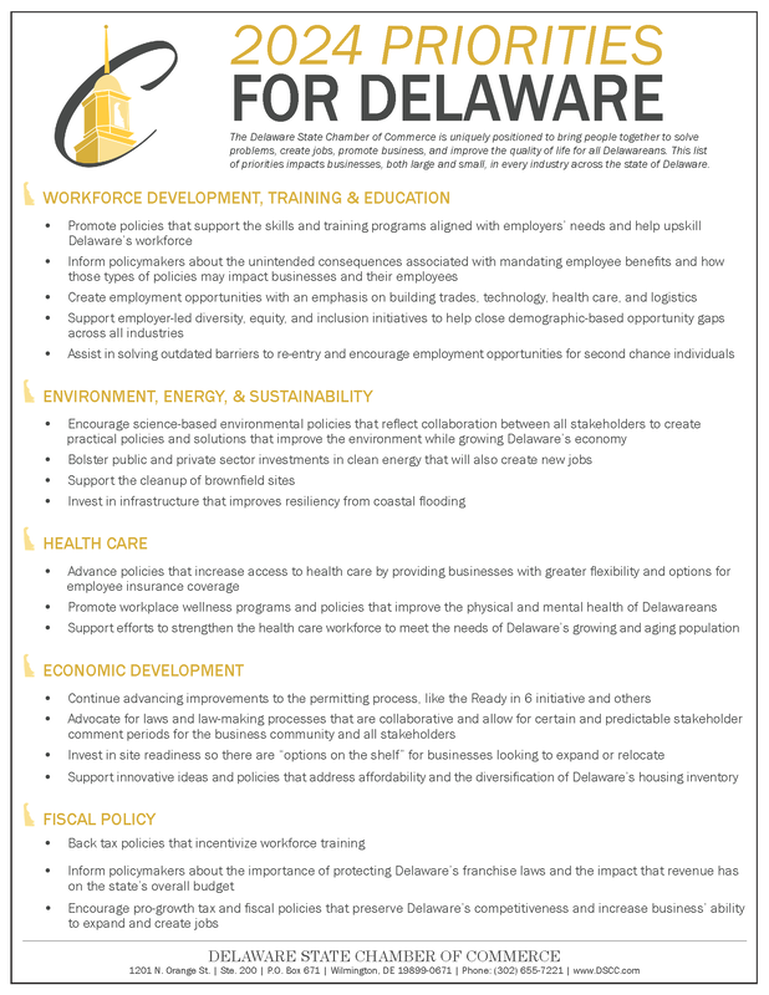




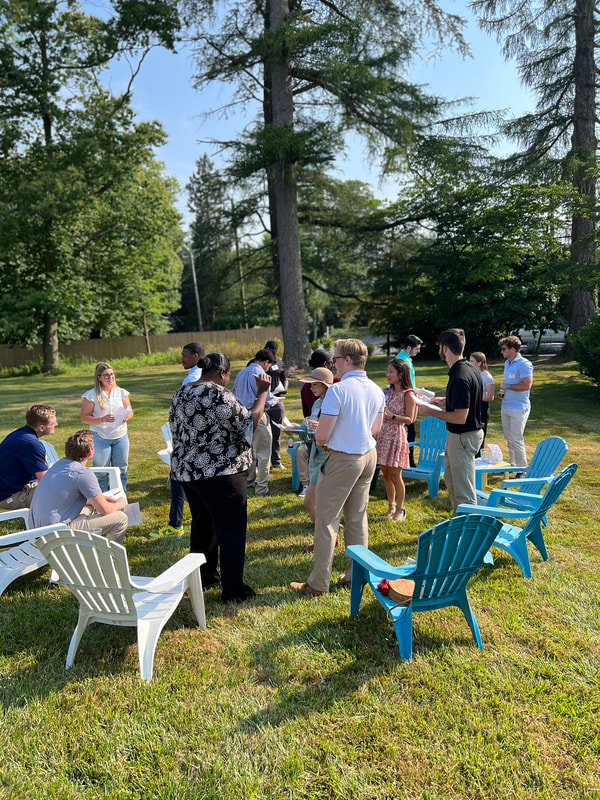






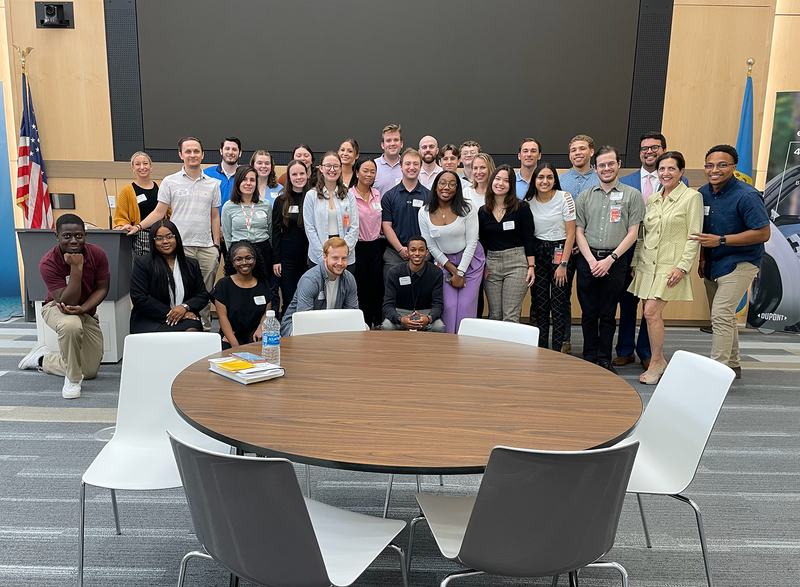
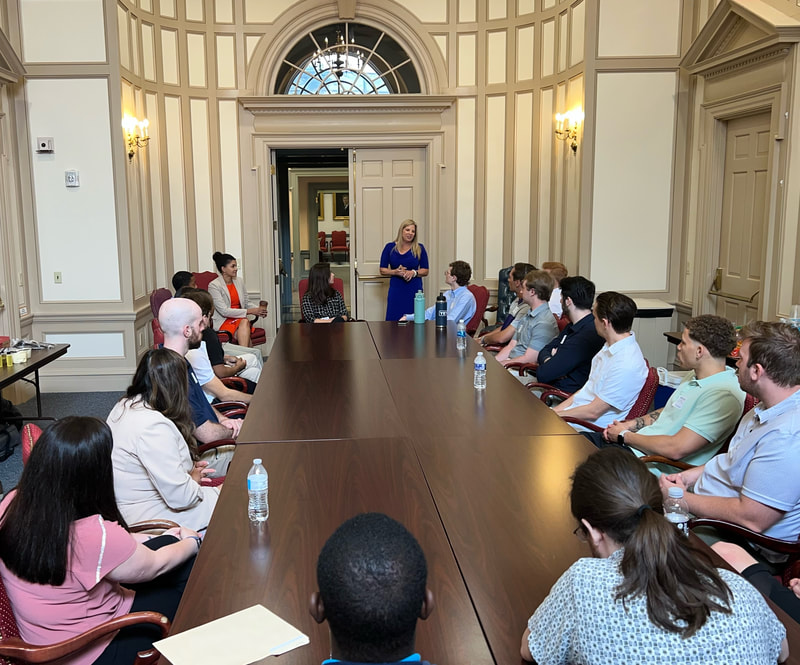
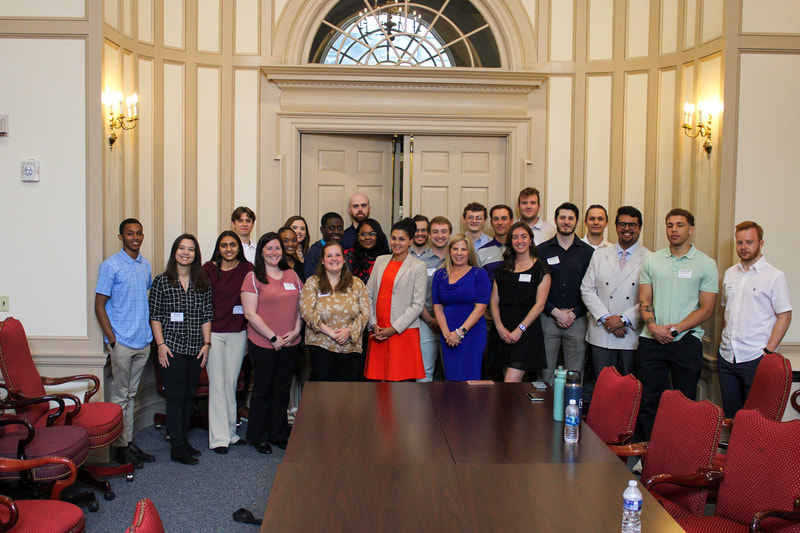
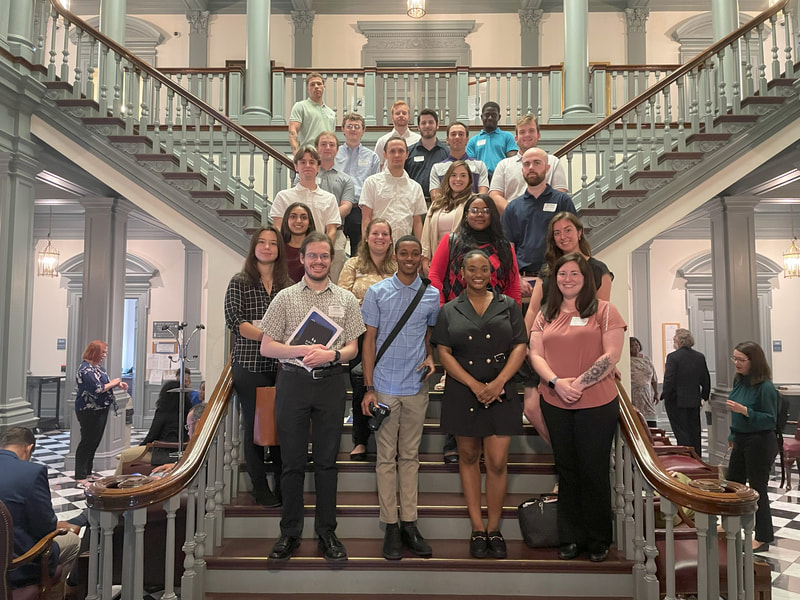


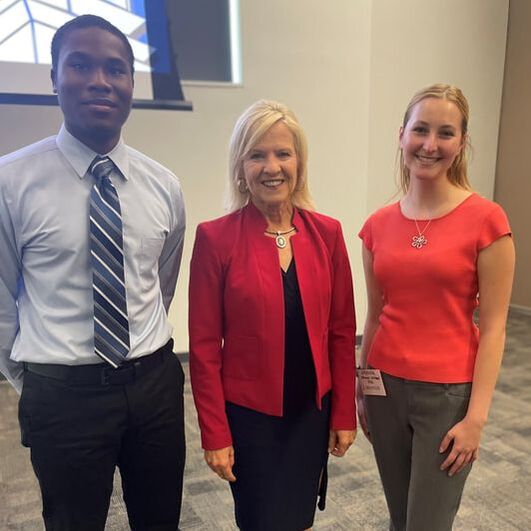

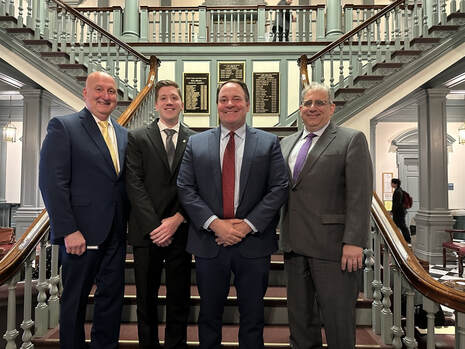
 RSS Feed
RSS Feed